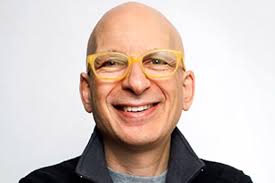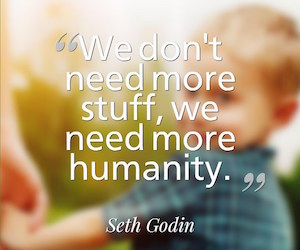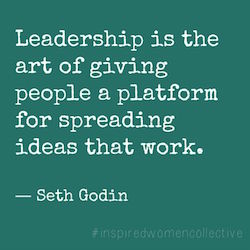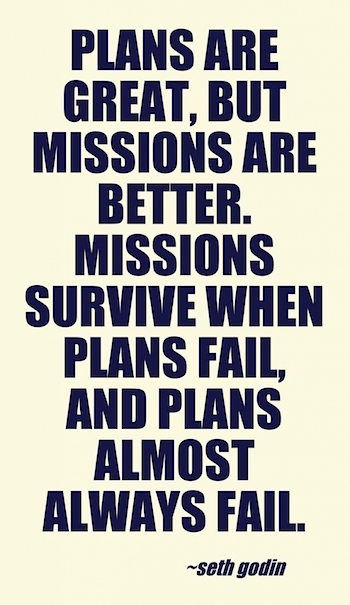 There is one blog I read every day. It’s Seth Godin’s blog. He’s not an educator by profession – he’s a thinker, marketer, innovator and prolific author – but much of what he has to say has application for our work. And his words often inspire me personally and professionally.
There is one blog I read every day. It’s Seth Godin’s blog. He’s not an educator by profession – he’s a thinker, marketer, innovator and prolific author – but much of what he has to say has application for our work. And his words often inspire me personally and professionally.
I remember about a year ago he wrote a blog post on the perceived differences between people. Seth’s point: We have so much in common, he said, yet we almost always notice the differences in others first. He concludes his short post this way:
 “For as long as we’ve been keeping records, human beings have been on alert for the differences that divide us. Then we fixate on those differences, amplifying them, ascribing all sorts of irrelevant behaviors to them. Until, the next thing you know, we start referring to, ‘those people.’
“For as long as we’ve been keeping records, human beings have been on alert for the differences that divide us. Then we fixate on those differences, amplifying them, ascribing all sorts of irrelevant behaviors to them. Until, the next thing you know, we start referring to, ‘those people.’
“It seems as though it’s a lot more productive to look for something in common. Attitudes and expectations. Beliefs in the common good and forward motion. A desire to make something that matters…
“Because there’s always more in common than different.”
At the bottom of this post Seth added this note: Just out, here’s a bonus interview with Marie. Well, I didn’t know who Marie was, but she turned out to be Marie Foreleo, a well-known business coach with a site called MarieTV. She’d just posted an interview with Seth that she titled “Seth Godin Thinks You Should Stop Waiting for the Right Moment.” I immediately scrolled down to the video link and clicked.
I’m glad I did and I hope you’ll take the time to do the same thing. The content is engaging and intriguing, and who knows – it may feel like the shortest 30 minutes you’ve ever spent.
Here are some of the highlights:
- Godin makes it a point to “intentionally seek out what I’m wrong about.” It works this way. He finds a trusted friend and first talks about a belief he holds that he’s very certain about. Then he plays the devil’s advocate and talks about why his position is wrong. Godin contends that this type of dialogue enriches one’s understanding, forces reflection, and often shifts thinking and perspective.
 When asked about how to be the most productive, Godin suggests “buzzer management.” Comparing productivity to the game show Jeopardy, he contends that those who win Jeopardy often hit the buzzer before they’re sure they know the answer. In that split second between making the commitment (pressing the buzzer) and having to deliver, they can often come up with the correct answer. He offers an example of this productivity strategy from his own life. He stakes out a commitment, which he likens to plunging the buzzer button. For instance, he writes a daily blog. Every day. Knowing that is going to happen, he makes it a priority.
When asked about how to be the most productive, Godin suggests “buzzer management.” Comparing productivity to the game show Jeopardy, he contends that those who win Jeopardy often hit the buzzer before they’re sure they know the answer. In that split second between making the commitment (pressing the buzzer) and having to deliver, they can often come up with the correct answer. He offers an example of this productivity strategy from his own life. He stakes out a commitment, which he likens to plunging the buzzer button. For instance, he writes a daily blog. Every day. Knowing that is going to happen, he makes it a priority.- Toward the end of the interview, Godin turns to education. Arguing in favor of free range kids, he talks about the importance of seeding curiosity in our students and the willingness to make mistakes. He believes that the purpose of schooling should be two fold: (1) Teaching kids to lead, and (2) Teaching kids to solve interesting problems. Godin believes that learning happens when you fail at something and reflect on what and why. That helps you move out of your “cocoon” and begin to think. When asked what he would ask a student after school, he said this: “Tell me something amazing you learned in the spirit of doing something good for someone else, and tell me some really dramatic failure that occurred as you were trying to solve an interesting problem.” (Would students in our schools be able to tell their parents this?)
 The final question of the interview asked Godin to name the most valuable metric we can apply to our work. He believes it should be this:
The final question of the interview asked Godin to name the most valuable metric we can apply to our work. He believes it should be this:
Will people miss you when you’re gone?
He’s found that successful people learn how to matter to someone else by treating them well, by addressing a need. You don’t have to do that for everyone, he stresses. Just for someone. And then, over time, you continue to reach out – from one person, to five, to more.
The interview reaffirmed to me the value of reading Seth’s blog every day. It is not only time well spent, it almost always causes me to reflect. That’s something that all of us should try to do on a regular basis, don’t you think?
Check out Seth Godin this weekend
Our ABPC communications consultant John Norton helped me put together this list of some of my favorite Seth Godin blog posts from the past several years that make a connection to leadership and learning. They’re never very long – sometimes less than 100 words. Try a few and see if you find yourself reflecting, too.
 Making change (in multiples)
Making change (in multiples)
Drawing a line in the sand
Open or closed?
Is ignorance the problem?
Yelling upstairs
Losing by winning

Terrific post. I’m going to put this quote on my office wall to counter my overly cautious nature: “Those who win Jeopardy often hit the buzzer before they’re sure they know the answer.”